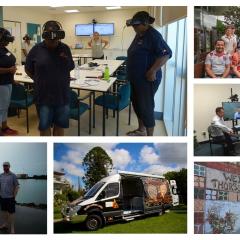An integrated telehealth service could help close the gap for Indigenous Australians with dementia living in rural and remote communities.
The University of Queensland’s Centre for Online Health is working with Aboriginal and Torres Strait Islander health services on a new telehealth-supported project.
Centre Director Professor Anthony Smith said the service would provide specialist geriatric consultations via videoconference for people with dementia and their carers living in rural and remote areas of Queensland.
“Aboriginal and Torres Strait Islander people as young as 45 are being diagnosed with dementia, and Indigenous people experience the disease at a rate three to five times higher than the general population,” Professor Smith said.
The service, based at Brisbane’s Princess Alexandra Hospital and Cairns Hospital, aims to provide earlier diagnosis and better treatment.
Cunnamulla Aboriginal Corporation for Health CEO Kerry Crumblin said areas previously not covered by specialist services would benefit from the program, and patients at high risk could be targeted.

“By having a telehealth-supported dementia service based at a primary health care centre, it means people will not have to travel to access care, and the videoconferencing equipment will be available for other services as well,”Ms Crumblin said.
Indigenous health workers will receive support from the Dementia, Regional and Remote, Empowering, Aboriginal and Torres Strait, Medicine, Telehealth (DREAMT) project team to provide education, awareness and prevention programs.
The DREAMT project is funded by the Department of Health, Dementia and Aged Care Services Fund.
Media: Christine Howard, DREAMT Project Manager, Christine.howard@uq.edu.au, +61 7 3176 4486, UQ Medicine,med.media@uq.edu.au, +61 7 3365 5133.



